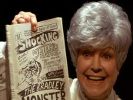Eye For Film >> Movies >> Basket Case 2 (1990) Film Review
"I understand your pain, Belial, but ripping the faces off people may not be in your best interest."
So, in her hilariously understated way, says Granny Ruth (Annie Ross) to the murderous mutant that she has welcomed into her family home with a love, compassion and understanding that she does not always (ever?) extend to more ordinary humans. Her line cuts to the contradiction at the heart of this belated sequel to Henenlotter's cult feature debut Basket Case (1982).

Ruth, an old friend of Belial's loving but long since deceased aunt, has devoted her life to sheltering a menagerie of freaks from the prying eyes of the world. She lives up to her name when it comes to the outsized and ostracised, but is altogether more ruthless in her dealings with their 'normal' persecutors. She always has the 'best interest' of her wards in mind – but that does not stop her from indulging, even provoking, their more aggressive impulses against interfering outsiders.
If, as we watch the humans' ugly prejudice and the mutants' disproportionate revenge, we are not sure on whose side we should be, then that is also precisely the dilemma that faces protagonist Duane Bradley (Kevin Van Hentenryck). Born conjoined to – and later forcibly removed from – his deformed psychic twin Belial. Duane has a love-hate relationship with his brother, and longs for a regular life, while never quite able to acknowledge his own egregious oddity (something that Van Henteryck's limited acting skills serve only to pronounce).
After the brothers survived the fall with which the original Basket Case ended, they are held in a hospital on suspicion of multiple homicides, but manage to escape, and fall in with Granny Ruth, her granddaughter Susan (Heather Rattray), and an attic-full of grotesquely deformed creatures. Now that Belial is amongst friends, and even has a girlfriend in the similarly mutant Eve, Duane hopes to fly the coop with the more normal-seeming Susan – but as a pesky reporter (Kathryn Meisle) circles her big scoop, endangering the very existence of this fragile family, Duane will discover that some ties can never be fully severed, and that sometimes you just have to get your freak (back) on.
One moment, at the end of Basket Case, Duane and Belial are plummeting to a Lower Manhattan pavement in 1982, the next, at the beginning of Basket Case 2, they are recovering in hospital – and while in story terms this is meant to be at most a few days afterwards rather than the eight years that elapsed before the sequel was made, nonetheless this pair emerge, Rip Van Winkle-style, in the very different milieu of the early Nineties. Miraculously gone is Duane's big Eraserhead-meets-Eighties hair, replaced with a sleeker, more manageable coif. And while in the first film Duane and Belial made their temporary home in a squalid Tribeca hotel populated by a freakshow of bums, prostitutes and thieves where the brothers - almost – fit in, now they take up residence in the leafy suburbs of a gentrified, upwardly mobile, conformist America where otherness is either confined to the closet/basket/attic or pruriently exposed and commodified as a sideshow attraction.
Meanwhile Belial, once a cheap but effective concoction of latex and claymation, has here been upgraded to a new physical model that, though more detailed and mobile, is somehow neither as repulsive nor as attractive as his earlier incarnation. This time he is joined by a whole bestiary of make-up monsters which, much like their brethren in the thematically similar Nightbreed (released in the same year), do not so much tread as trample the fine line between terrifying and lovable – and in so doing they abandon the deep sleaze that was part and parcel of the original's charm for a cutesy amiability that never quite works.
Although these monstrosities all band together against perceived outside threats, it is always left to Belial himself to do the actual killing – and this he does with a bludgeoning repetition that lacks the shock value of the original film, not least because this time round he is acting to preserve his newfound family rather than just to pursue his own vicious vendetta. Where Belial once raped, now he engages in emphatically consensual, if bizarre, sex, and embraces the responsibilities that come with family life.
In other words, he is settling down and growing up – but unfortunately his domestication is also the film's. For all the creature effects and gore on offer here - not to mention bad acting and risible dialogue - Basket Case 2 feels cosily tame. Perhaps that is precisely Henenlotter's aim: to normalise the freaks and freak out the normals. Yet, much like Tod Browning in 1932's Freaks, Henenlotter is so eager to reduce each of Ruth's family members to their outlandish physical signifiers – one looks and croaks like a frog, one resembles a rat, one has multiple noses, etc - that, for want of any further characterisation, we are positively encouraged to look at their monstrosity and overlook their humanity like paying, baying gawkers at a circus exhibition of biological rarities.
It is an effect that comes with subtle horrors of its own – but for the most part, Basket Case 2 is itself a hybrid horror-comedy curiosity, neither scary nor particularly funny.
Reviewed on: 22 Oct 2012

















